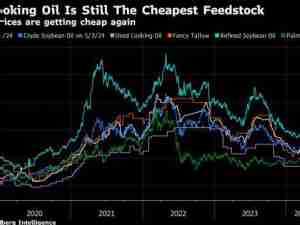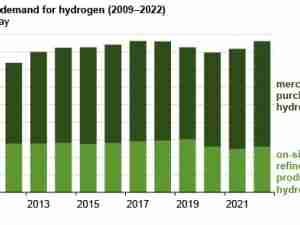Beaumont rail terminal custom blends crude for refiners
By: Reuters | Sep 15 2015 at 02:42 PM | Intermodal
BEAUMONT, Texas - A southeast Texas oil-by-rail operation specializing in Canadian heavy crude is increasingly creating blends tailored to fuels that U.S. Gulf Coast refiners aim to make with it.
Jefferson Energy Companies in Beaumont, across the Neches River from Exxon Mobil Corp’s 344,600 barrels per day (bpd) Beaumont refinery, this fall will open its second heated 100,000-barrel blending tank to mix largely undiluted Canadian crude with domestic crudes as individual refiners desire.
Such blending ensures viscous Canadian crude can flow in a pipeline. But Jefferson whips up craft crudes to help refiners maximize yields, or the amount of gasoline or diesel made from each barrel of oil.
“We’re making sure they get compatible and consistent crude oil to the refinery, whether it’s for further blending or direct processing,” said Micki Kennedy, Jefferson’s technical services manager and a chemist.
Blending crude before it reaches refineries is nothing new. Crude from Texas, the Rocky Mountains, Canada, North Dakota and other oilfields get tossed together regularly at the U.S. crude futures hub in Cushing, Oklahoma, before it reaches refiners.
And once there, refiners often blend further to get the best cocktail to make gasoline or distillates.
However, some refiners are increasingly securing their own crude from the field, replacing Cushing blends that often have lesser yields - and profits - than oil with more consistent quality.
Last week Phillips 66 Chief Executive Greg Garland told analysts the company is moving toward buying all crude bound for its 200,000 barrels per day refinery in Ponca City, Oklahoma, in the field because it “gives better yields and higher throughputs than the blended barrel you find at Cushing.”
Gulf Coast refiners, which increasingly receive Canadian crude via rail, also want blends that maximize yields and profits.
Jefferson’s Canadian crude arrives with very little diluent, unlike what moves in a pipeline. The company can then blend with super-light condensate, or typical West Texas Intermediate crudes, to individual refiner specifications, Kennedy said.
Greg Binion, president of Jefferson Energy, said variety in available blending crudes allows custom mixtures with lowest-cost crudes that target gasoline or diesel production.
“Here you bring the rail barrel in neat, put it in a tank, blend with whatever makes the most economic refinery throughput handling and refinery optimization,” he said.

